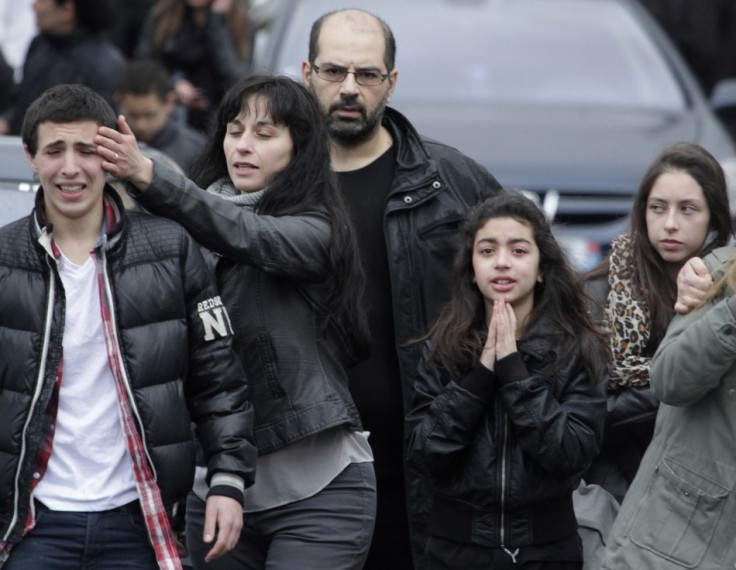Ozar Hatorah Jewish School Hitman Hunted after Four Killed

The attack at the Ozar Hatorah Jewish school in Toulouse, which claimed the lives of at least three children and possibly a rabbi, mirrors the recent killings of three soldiers in France.
Witnesses outside the school said a man on a black scooter opened fire on people waiting at a drop-off point and then fled.
The rabbi's two sons, aged three and six, were among those reported killed.
The fourth victim was the school principal's daughter and was aged between eight and 10, Rahamim Sabag, a rabbi who works at the school, told the Guardian.
'Vision of Horror'
Witnesses said a man, armed with two weapons opened fire outside and then inside the school before fleeing on a black scooter.
"I saw two people dead in front of the school, an adult and a child. Inside, it was a vision of horror - the bodies of two small children," a distraught father told RTL radio.
"I did not find my son. Apparently he fled when he saw what happened. How can they attack something as sacred as a school?"
AFP news agency said the gunman initially used a 9mm weapon, but it jammed so he switched to a .45 calibre gun.
The shooting has shocked France and parents present at the school said the crime was motivated by anti-Semitism.
President Nicolas Sarkozy and Claude Gueant, the interior minister, had planned to visit Toulouse on Monday to drum up support for Sarkozy's re-election bid, but said they would now cancel the events out of respect for the people affected by the attack.
Sarkozy, who visited the scene, described the killings as a "frightening tragedy".
Gueant and Francois Hollande, the Socialist party's candidate in next month's presidential elections, are expected to visit the school.
French authorities are still hunting the gunman.
Last week a man on a black scooter also killed three soldiers in two separate incidents. They were all of north African origin.
In all three attacks the gunman used a .45 calibre weapon, prompting speculations of a link.
President Nicolas Sarkozy said it is much too early to determine a definite link.
"Whatever happens," he explained, "faced with this kind of toll, we can say that the French Republic as a whole has been hit by this appalling tragedy."
The latest killings follow the death of a 30-year-old off-duty paratrooper who was gunned down in a residential area of Toulouse just over a week ago and the killing of two soldiers and injury of a third in the city of Montauban, just a few kilometres from Toulouse.
The three military men were standing at a cashpoint when a man on a scooter pulled over and shot them.
Witnesses and local residents of Toulouse have linked the school shooting to the attacks on the soldiers.
Same Killer?
Speculation about the gunman's motives in those killings have been rife.
While first theories centred on a potential terrorist-led attack against the French military, investigators refused to rule out other possibilities and insisted the killer could be acting independently.
Police have linked the two military attacks. In both cases the soldiers were killed at point-blank range with a bullet to the head by a gunman on a scooter. Reports suggest the same weapon was used.
The two men killed in the Montauban attack had northern African origins; the soldier who was injured originated from Guadeloupe.
Media speculated that the gunman could be from the far right, as the attack took place on the week commemorating the Evian Accords between France and the Algerian National Liberation Front. The agreement, signed 50 years ago, put an end to the eight-year war of independence between France and Algeria.
Tensions between the two countries are still high and the war remains a sensitive point in both countries.
A Dangerous Mix?
Reports that the latest shooting in Toulouse targeted a Jewish school has increased speculation that the attacker could be from the far right.
In the last few weeks, the debate over immigration and the need for more integrationist policies has raged in France.
Marine Le Pen, leader of the National Front (FN), France's largest far-right political party, is running in next month's presidential elections and has led the debate on the sale of halal meat, accusing Muslims of taking over French traditional butchers.
Her argument was hijacked by Nicolas Sarkozy, who is running for re-election but trailing behind his main Socialist party rival Hollande, with commentators saying his move was an attempt to attract potential far-right voters. He has also said there were too many foreigners in France.
Latest surveys suggest that Le Pen will get 17 percent of first-round votes on 22 April, but such surveys have not proved accurate in the past.
Illegal immigration has become one of the election campaign's focal points. Under Le Pen's leadership, the National Front has gained significant popularity in France. Her image as an ordinary mother-of-two has proved more appealing than that of her father and previous FN leader, Jean-Marie Le Pen.
Analysts have linked the rise of the far-right group to the country's declining economic situation. Many have warned about the dangers of the party's anti-immigration, Islamophobic and xenophobic policies.
Nicolas Sarkozy's Union for Popular Movement (UMP) has also stepped up its anti-immigrant rhetoric and populist ideology, promoting accusations that the party was drifting towards the far right.
The party's secretary-general, Jean-François Copé, was recently criticised for suggesting that Muslims should be prevented from praying in Arabic.
The leaders of France's six main religions issued a statement against a UMP public forum on secularism, which they said was a veiled Muslim-bashing event used to win back voters with far-right tendencies.
France Shooting: Jewish Communities in Europe Under Threat
© Copyright IBTimes 2025. All rights reserved.




















